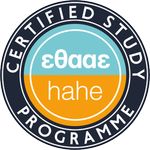Overview
The programme aims to provide education at postgraduate level in the field of cybersecurity as well as focus on technologies and practices needed to detect and prevent threats against information systems on the Internet. All modern organizations face security risks that threaten their valuable assets; this program aims to provide high quality training and formal education in cybercrime analysis while gain advanced knowledge to protect organizations against cyber security risks. It is also designed to deliver cutting-edge, up-to-date cybercrime investigation techniques, strategies and tactics that allow students to understand and tackle emerging trends in cybercrime.
This program enhances knowledge and develop practical skills in cybercrime while offers in-depth study, develop critical, analytical and technical skills involving the principles, practices and techniques of Cybercrime Investigation. The courses include lectures and laboratories exercises with the later technologies by leading academics from Greece and abroad, along with projects and dissertation work, which ensures that graduate students equipped with state-of-the-art scientific knowledge and modern practical skills, on their way to become highly competitive at international level. The main subject areas included in the taught modules:
- Digital Forensics
- Intrusion detection and Network Security
- Security Audit & Compliance
This program is designed for University graduates of Informatics/Computer Science, Electrical Engineering but also of Natural Sciences, Economic and Business Departments, with a background in ICT and a strong motivation to pursue a career in Cyber Security. The courses of the programme are taught exclusively in English.
The academic staff comes from Universities in Greece and abroad. In addition, it is possible to attend the programme combining distance learning with traditional face-to-face teaching
Official Government Gazette:


Start date: October 2025
Application deadline: 26 August 2025
Campus: Thermi, Thessaloniki
Duration/Mode: 18 months (full-time) or 30 months (part-time)/(available also in distance learning mode)/weekdays evenings
Taught language: English
Entry requirements: An undergraduate degree from an accredited University
Language requirements: English language knowledge documented with a relevant certificate, corresponding at least to the State Certificate of Language Learning Level B2 or other certificate proving good knowledge of English. Holders of an undergraduate or postgraduate degree at a Foreign University in English are exempt from this obligation.
Fees: 2,900€ (total)
How to apply: Applications system


Who can apply
To be considered for the programme, candidates are required to have:
An undergraduate degree from a Higher Education Institution in Greece or a recognized Higher Education Institution from abroad. STEM (Science, Technology, Engineering and Mathematics) degrees are deemed to be compatible with the programme. However, other degrees are also considered in case of solid background in ICT. Students who owe a small number of courses to obtain the degree, if accepted, have the right to enroll in the Postgraduate Program only if they submit a certificate of completion of studies by the deadline for their registration.
English language knowledge documented with a relevant certificate, corresponding at least to the State Certificate of Language Learning Level B2 or other certificate proving good knowledge of English. Holders of an undergraduate or postgraduate degree at a Foreign University in English are exempt from this obligation.
Enrolment Procedure
Enrolment of the accepted candidates involves providing to the Secretariat the following three documents, adhering to the instructions given here:
- Validated and filled registration form.
- Payment of the tuition fee deposit as specified in the letter of acceptance.
- Validated copy of your bachelor’s degree:
-
- Greek University graduates should provide a clear photocopy of the original degree.
- Non-Greek University graduates should provide an authenticated degree.
Please be advised that the validation of your degree and the registration procedure, which includes validation at a Greek Consulate or Embassy in your country, may require significant time, sometimes more than 3 months.
Courses
The MSc in Cybersecurity Programme comprises two (2) semesters of courses and one (1) semester for preparing the postgraduate thesis for full-time students, and four (4) semesters of courses and one (1) semester for preparing the postgraduate thesis for part-time students. Upon arrival at the IHU, all students may attend foundation courses in Java and SQL, that aims to bring all incoming students to the same level with respect to some of the programming knowledge that is required.
Students can be included in the process of preparing a postgraduate dissertation only If they have been examined in all courses of the first and second semester of the Postgraduate Programme. All courses are delivered in English.
Ninety (90) European credit units (ECTS) are required to obtain the master’s degree, which are accumulated with the participation of postgraduate students in all activities of the programme, as described in the following table.
| Course | Semester* | Type |
|---|---|---|
| Computer Networks | 1/1 | Compulsory |
| Cybercrime and Incident Response | 1/1 | Compulsory |
| Information Systems Security | 1/1 | Compulsory |
| Computer Forensics | 1/3 | Compulsory |
| Legal and Ethical Foundations of Privacy and Security | 1/3 | Compulsory |
| Data Protection and Cryptography | 2/2 | Compulsory |
| Intrusion Detection and Event Management | 2/2 | Compulsory |
| Penetration Testing | 2/4 | Compulsory |
| Advanced Digital Forensics and Malware Analysis | 2/4 | Elective |
| Consulting Project | 2/4 | Elective |
| Internet of Things | 2/4 | Elective |
| Knowledge Management in the Web | 2/4 | Elective |
| Software Development Methodologies | 2/4 | Elective |
* Full-time/Part-time students
The Dissertation
During the third term (for full-time study) or the fifth term (for part-time study), students work on their Masters Dissertation project, the thematic area of which is relevant to their programme of studies and their interests. The dissertation provides a good opportunity to apply theory and concepts learned in different courses to a real-world e-Business problem or challenge. Students are supervised throughout their projects by a member of the academic faculty and the academic assistants. After submission of the dissertation, students present their projects to classmates and faculty at a special event.
Duration of studies
The duration of the full-time study programme in order to obtain the Master’s degree is three (3) academic semesters. For students who so wish, there is also the possibility, upon request, of attending the programme on a part–time basis. In this case, the duration of the programme will be five (5) academic semesters.
Lectures mainly take place on weekday evenings, usually after 17:00, and perhaps on Saturday and/or Sunday mornings. The programme is also available through distance learning.
Summative assessment: Students will be typically required to be physically present at the University for the final exams at the end of each semester.
Quality Policy
Study Guide
Programme Regulation
Handling Objections and Complaints

Students’ Complaints Procedure
Students who wish to make a complaint concerning the quality of an academic programme, any related service or member of the academic or administrative staff should first do so at the local level, by raising the issue with the individual, department or service provider directly involved. Issues of concern may often be resolved more quickly and effectively at this stage.
If a student decides to make a complaint, this will be taken seriously, and confidentiality will be respected. Investigations will be carried out thoroughly and the issue determined fairly by someone who is not directly involved in the complaint. It should be noted, however, that complaint resolution may not be possible without revealing the identity of the complainant to the subject of the complaint and anonymous complaints will not be investigated. Allegations which are found to be unsubstantiated or malicious will be dismissed.

Appeal Committee
Students are entitled to submit an appeal to an Appeal Committee, appointed by the Governing Board, with respect to any decision concerning their status at the University. A student submitting an appeal is invited to exercise his/her right to be heard, according to Article 6 of the Greek Administrative Procedure Code.
Appeal Committee examines any appeals against decisions of the Governing Board and/or the General Assembly of the School according to Article 24 of the Greek Administrative Code of Procedure.

Student Ombudsman
Students also have the right to appeal to the Student Ombudsman. There are three independent offices under the name “Student Ombudsman” at I.H.U: a) at the University Campus of Thessaloniki, b) at the University Campus of Serres, and c) at the University Campus of Kavala.
Administration
Director
- Assoc. Prof. Christos Tjortjis
Steering Committee
- Assoc. Prof. Christos Tjortjis
- Prof. Panayiotis Bozanis
- Prof. Maria Drakaki
- Assoc. Prof. Tzetzis
- Asst. Prof. Spiros Papakostas
The Academic Faculty
Other Research and Teaching Personnel
Collaborating Instructors
Full Professor
Full Professor
Assistant Professor
Fees & Financing
Fees
The programme fees for the MSc in Cybersecurity is 2900€. The amount is payable in two instalments for the full time mode or in four instalments for the part time mode at the beginning of each semester. The fees are also eligible for financing through LAEK 0,45% – OAED programme.
Deposits
If you have been accepted to a postgraduate programme, you will need to make a payment of the deposit of 500 Euros to secure your place. This amount will count towards the first instalment of your tuition fees. The deposit is non-refundable once you have commenced your studies at the IHU. Prior to that, a refund can be made but a 20% administrative fee will be retained. The deposit can be paid by bank transfer or bank draft. Credit card payments can be made through electronic banking (contact your Bank as handling fees may apply).
Scholarships
The School of Science & Technology offers a number of scholarships for the programmes it offers, covering a significant proportion of the fees. These scholarships are competitive. Award criteria include the quality of the first degree, the undergraduate grades of the candidate, his/her command of the English language and overall profile. Candidates for scholarships should include a separate letter with their application documents in which they request to be considered for a scholarship, stating the reasons why they think they qualify.
Programme announcement – Admissions
The Courses of the MSc Programme start in mid-October.
Applications deadline: 26 August 2025.
How to apply: Applications system
Academic Partners
![]() CompTIA Cybersecurity Certifications – Please contact Dr. Baltatzis for further information/details.
CompTIA Cybersecurity Certifications – Please contact Dr. Baltatzis for further information/details.
 Certified Ethical Hacker (CEH) Certification – Please contact Dr. Baltatzis for further information/details.
Certified Ethical Hacker (CEH) Certification – Please contact Dr. Baltatzis for further information/details.
 Penetration Testing Labs – Please contact Dr. Baltatzis for further information/details.
Penetration Testing Labs – Please contact Dr. Baltatzis for further information/details.
Ideal Career path
Throughout history, communications security, data protection and information assurance have always been issues of outmost importance to every company, organization and government. The internet revolution boosted the role of information (and its protection) to an unparalleled level of significance, as virtually every individual or organization is storing or transmitting increasing volumes of sensitive data electronically. Even though communications and security specialists were always sought after, the rapid evolution of relevant technologies and the penetration of their applications to every aspect of human life have increased the level of complexity of the required solutions. What is also important, for a prospective security specialist to know, is that security specialists are working in close collaboration with the management of their organization, which gives their job a burden of responsibility but also provides great opportunities for longevity and promotion to the higher levels of the hierarchy. Today, the role of a company’s CIO (Chief Information Officer) has been recognized as a strategic position that creates an interface between the management and the ICT. Graduates from the MSc in Cybersecurity programme can play a pivotal role in the unremitting operation of virtually any company or organization, by safeguarding their most valuable asset, their information. Therefore, a multitude of employment opportunities are envisaged for graduates of this programme. Indicatively they include:
- ICT companies
- Government organisations and institutions
- Multinational Corporations and Small and Medium Enterprises (SMEs)
- e-business companies
- Mobile network providers and broadband Internet providers
- Sensor networks and telematics companies
- Consulting and auditing companies
- Research institutes
- Education, training and certification
- Defense industry
In addition to technical skills gained through study, our students benefit from the University’s excellent Careers Office, in order to attain essential soft skills (e.g. communication skills, interview preparation, CV writing etc.) to better prepare for the job market.
Location
The MSc in Cybersecurity takes place in the facilities of the School of Science & Technology of the University Center of International Programmes of Studies of the International Hellenic University in Thermi-Thessaloniki.
Contact
Email – Telephone
For issues/information related to the Programmes of Study of the School, you can contact us by either e-mail infotech@ihu.edu.gr or phone at +30 2310 807 529
Postal Address
School of Science and Technology
14th km Thessaloniki – N. Moudania
57001 Thermi
Thessaloniki, Greece


